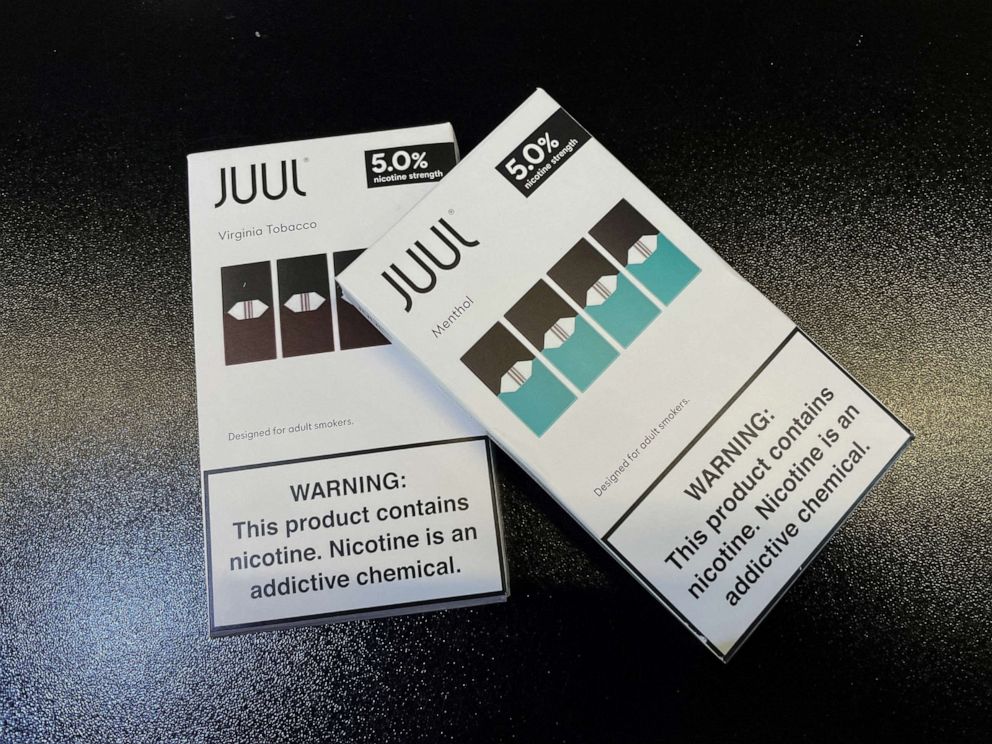What is next for Juul after FDA temporarily suspends ban of its e-cigarettes and other products?
The FDA said it needs to conduct "additional review."
Popular e-cigarette manufacturer Juul Labs, Inc. has been left in limbo after the U.S. Food and Drug Administration said it is temporarily pausing a ban on the company’s products.
The federal health agency announced Tuesday on Twitter that it was issuing an administrative stay because "there are scientific issues unique to the Juul application that warrant additional review."
This means the ban of Juul’s products is temporarily suspended, not rescinded.
The order was initially issued on June 23 but was blocked one day later by a federal appeals court. The FDA’s stay will continue throughout the appeals process.
For Juul to keep its e-cigarettes and other products on store shelves, the manufacturer must show that its products benefit adult smokers -- meaning helping them quit or reduce their use of traditional cigarettes -- and are unlikely to have underage users addicted.

At the time the ban was issued, the FDA said Juul had provided the federal agency with insufficient and conflicting data about any potential health risks or that Juul products benefited public health.
Juul has previously stated it believes it submitted enough information to "address all issues raised by the agency."
It’s unclear if Juul will be able -- or be required -- to submit any further data while the FDA conducts the additional review.
"With this administrative stay from the FDA now in place, we continue to offer our products to adult smokers while we pursue the Agency’s internal review process," Joe Murillo, chief regulatory officer at Juul Labs, said in a statement to ABC News. "We remain confident in the quality and substance of our applications and believe that ultimately we will be able to demonstrate that our products do in fact meet the statutory standard of being appropriate for the protection of the public health."
The statement continued, "We now look forward to re-engaging with the FDA on a science- and evidence-based process to pursue a marketing authorization for Juul products."
Politicians and anti-tobacco advocates have accused the company of using flavors such as creme, mint and menthol -- along with a sleek design resembling a USB flash drive -- to market vaping to U.S. children and teenagers.
More than 2 million American middle and high school students used e-cigarettes in 2021 -- with eight in 10 students saying they use flavored e-cigarettes, according to the FDA.
The 2020 National Youth Tobacco Survey found Juul was the most popular e-cigarette brand used by adolescents with 25.4% of high school e-cigarette users and 35.1% of middle school users saying Juul was their most used brand.
Nicotine exposure from e-cigarettes can hinder brain development in adolescents and young adults, which can continue into the mid-20s, according to the Centers for Disease Control and Prevention.
Just one Juul pod contains as much nicotine as a pack of 20 traditional cigarettes, the manufacturer has said.
The CDC also says e-cigarettes can contain heavy metals and cancer-causing chemicals that can damage the lungs.
In 2009, Congress gave the FDA authority to regulate the manufacturing, distribution and marketing of tobacco products.
E-cigarette manufacturers, including Juul, were required to submit their products to the FDA to review by September 2020 but were able to sell products while the FDA review was under way.




